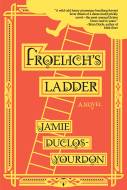15 Things You May Not Know About Jamie Duclos-Yourdon
Oregon has so many talented writers. Take for instance Jamie Duclos-Yourdon. Jamie, a freelance editor and technical expert, received his MFA in Creative Writing from the University of Arizona. His short fiction has appeared in the Alaska Quarterly Review, Underneath the Juniper Tree, and Chicago Literati, and he has contributed essays and interviews to Booktrib. Froelich’s Ladder (Forest Avenue, August 2016) is his debut novel. He lives in Portland, Oregon. Here are some things you may not know about Jamie.
When I was a kid, my mom said to squeeze her hand if I ever saw anything unusual. She hoped to prevent an embarrassing observation (we lived in New York, after all; everything was unusual), but I spent my time scanning my surroundings—and if I couldn’t spot the obviously unusual thing, I’d identify the smallest discrepancy.
2) What is your writing routine?
I wake up at 4:30 every day and write for an hour. I usually manage 300+ words, which is slightly more than a page. It doesn’t feel like much, but if you keep at it every day—seven days a week, with no exceptions—the material builds up pretty quickly.
3) How many drafts before you feel the book is finished?
Oh, gosh … I probably go through four or five drafts before I’m ready to share a manuscript with a publisher or an agent, and those drafts have already been vetted by my writing group. If a publisher or agent is interested, then I’ll undertake another two or three drafts. The story is always evolving (and, hopefully, improving).
4) What was the best thing that happened with regard to your writing career?
Having my first five books rejected. Through Book #6, I was still doing my best Nick Hornsby impression—which isn’t necessarily a knock on Nick Hornsby. It took me a long time to recognize my own voice and even longer to trust it.
5) What part of your job do you love the most?
I love Q&As with an audience. Even if I’ve heard a question before—and more often than not I haven’t—the context is always different, the underlying assumption is different, my mood is different, everything is different. I learn something new every time.
6) What do you like to read? Do you read while working on a novel?
I’m always reading, whether or not I’m working on new material. I mostly stick to fiction, with a few news sources to keep me informed. I’m really picky, in terms of the former (and the latter, I suppose), and I don’t like to reread novels or short stories; additionally, I don’t feel guilty putting down a book after 50 pages. So my reading process is like no, no, no, no, no, YES, no, YES, YES, no, no, no …
7) What was the best advice you received as a writer?
A professor of mine once said, “Learn what you write and when you write.” If you write flash fiction, cool, write flash fiction. If you write 150,000-word novels, then do that instead. Don’t try to be something you’re not. Same goes for whatever time of day suits your creative process: find it and stick to it.
8) Who has influenced you the most in terms of developing your personal writing style?
I took a fiction workshop with Aurelie Sheehan when I was twenty-four. She read one of my short stories and said, “Oh, you write about responsibility!” That observation had a profound effect on my writing.
9) Do you have a good luck charm or superstition?
I’ve had a storyteller on my desk since 2001—a ceramic figurine of a Pueblo Indian, mid-story, surrounded by her children. I’ll be devastated when I eventually, inevitably drop and break her.
10) If you weren’t a writer, what would you be?
I have absolutely no idea. Drunk?
11) What quote or personal saying do you live by?
Samuel Beckett said it best: Try again. Fail again. Fail better.
12) What’s next up for you, writing-wise?
I’m currently at work on my tenth novel, a Mesopotamian ghost story about death and grieving and talking crows and ancient Sumer.
13) If you could do anything over again, would you and what would it be?
In January of 2002, an agent at ICM expressed interest in my first novel. I thought, “Yay, this is it! The big time!” and spent the next six months sitting on my ass. I’d love to get that time back.
14) What advice would you give beginning writers?
Read everything. Write constantly. Be on the lookout for a mentor. Don’t assume debt for an MFA. Find community and earn your inclusion. Success isn’t zero-sum. Listen to what your readers have to say. There’s nothing wrong with adverbs. Writers make boring protagonists. Know what your characters want and what prevents them from getting it. Study screenwriting to learn three-act structure. What seems natural and obvious to you is completely foreign to the rest of the world. You are a writer. You are a writer. You are a writer.
15) Something we don’t know about you?
I’ll be the Keynote Speaker at the 2017 South Coast Writers Conference February 17–18.
And: what’d you like us to know about your latest release:
Froelich nurses a decades-old family grudge from his permanent perch atop a giant ladder in this nineteenth century madcap adventure novel, Froelich’s Ladder. When he disappears suddenly, his nephew embarks on a rain-soaked adventure across the Pacific Northwest landscape to find him, accompanied by an ornery girl with a most unfortunate name. In their encounters with Confederate assassins, European expatriates, and a general store magnate, this fairytale twist on the American dream explores the conflicts between loyalty and ambition and our need for human connection, even at the highest rungs.
If you’re still scrambling to find the perfect Christmas present, consider Jamie’s new book from Forest Avenue Press.
Happy Holidays!


